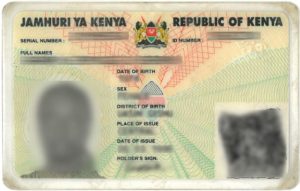Kenyans applying for identity cards (IDs) will start acquiring Maisha Numbers from September 30 this year.
According to Citizen Services Principal Secretary Julius Bitok, the Unique Personal Identifier (UPI) to be anchored on a digital platform dubbed Maisha Number will replace the country’s second-generation identity cards.
Following its rollout, the government will cease issuing of second-generation cards marking a digital transition in the country.

Addressing the media on Tuesday, September 12, Bitok noted that President William Ruto will launch the project to transition the country into a digital UPI-based national identity database on September 29.
The adoption of the new identifiers cost the government Ksh1 billion.
“The digital identity system will provide Kenyans with a secure and reliable way to verify their identity for a variety of purposes, including accessing gov’t services, opening bank accounts, and traveling,” Bitok stated in a past statement.
A Maisha Card will be issued under the new system, and a National Master Population Register established to consolidate government databases.
Maisha Namba will be the reference number for future identity for all subsequent stages: school, national ID, and KRA pin.
According to President William Ruto’s administration, the digital ID would champion inclusivity, unite government services, and lead governance reforms in state offices.
The project, which is similar in some aspects to Huduma Namba which was declared null and void during former President Uhuru Kenyatta’s tenure, seeks to connect various individual databases to facilitate effortless access to a comprehensive array of government services.
While launching the digital ID project, ICT CS Eliud Owalo insisted that there was no need for Kenyan citizens to bear a physical identification card when seeking government services.
“The rationale for conceptualizing the digital ID is informed by the fact that Kenyans do not need to physically flash an ID card in order to access government services,” Owalo stated.
“Kenyans should be able to conduct business from wherever they are once we have integrated government services onto technological platforms,” he added.
